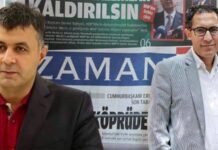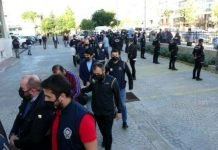Critics of President Recep Tayyip Erdoğan were profiled by Turkish diplomats in Budapest in line with an ongoing witch hunt carried out by the Turkish government around the world, judicial documents have revealed.
According to Nordic Monitor‘s report, spying lists sent home by Turkish diplomats led to a terrorism investigation of critics on fabricated charges conducted by a Turkish prosecutor. It is clear that Turkish diplomatic missions violate the domestic laws of receiving states and the principles of international law by conducting unlawful information-gathering campaigns and sweeping intelligence operations.
Judicial documents incorporated into a criminal case indicate that the Turkish Embassy in Budapest gathered information on persons believed to be affiliated with the Gülen/Hizmet movement, a group critical of President Erdoğan, and that Turkish teachers, representatives of intercultural dialogue center and local associations, businessmen and their family members living in the country had been profiled by Turkish diplomats.
The information reported to the foreign ministry in Ankara was later used in a criminal indictment for a charge of terrorism by Turkish prosecutor Birol Tufan.
According to a December 11, 2018 decision by Tufan, the Ankara Chief Public Prosecutor’s Office launched a separate investigation (file no. 2018/43629) into 12 innocent people who were listed in espionage files dispatched by Turkish diplomats in Budapest without any concrete evidence of wrongdoing. They were charged with “membership in a terrorist group” by Akıncı.
Those files might have been conveyed to the foreign ministry by Şakir Fakılı, the then-Turkish ambassador in Budapest between 2013-2017, and Erdoğan’s current envoy, Ahmet Akif Oktay.
Judicial documents dated December 11, 2018 exposed how the spying activities of the Turkish Embassy in Budapest triggered a criminal investigation in Turkey. (The names and addresses of the Turkish nationals have been redacted for security reasons.):

The judicial documents once more confirmed that spying activities by Turkish diplomatic missions result in serious consequences in the Turkish judicial system.
As previously disclosed by Nordic Monitor, the foreign ministry sent lists of profiled Turkish nationals in two CDs to the Ankara Chief Public Prosecutor’s Office, the national police and Turkey’s intelligence agency MIT on February 19, 2018 via an official document for further administrative or legal action, the punishment of their relatives back in Turkey and the seizure of their assets.
The public prosecutor who received the foreign ministry document on February 23, 2018 forwarded the classified CDs including information on 4,386 Erdoğan critics to the organized crimes unit of the Ankara Police Department for further action. The police conveyed the results of its investigations to the public prosecutor.
According to judicial documents released by the Ankara 4th High Criminal Court on January 16, 2019, the foreign ministry compiled a long list of foreign entities that were owned and/or operated by people who were seen as close to the movement.
Moreover, Nordic Monitor revealed how MIT infiltrated refugee camps in Greece in order to spy on opponents who were forced to flee to Greece to escape an unprecedented crackdown in neighboring Turkey.
Turkish diplomatic missions continue systematic spying on Turkish government critics on foreign soil as confirmed by Foreign Minister Mevlüt Çavuşoğlu in February, 2020. Çavuşoğlu said Turkish diplomats assigned to embassies and consulates have officially been instructed by the government to conduct such activities abroad. “If you look at the definition of a diplomat, it is clear. … Intelligence gathering is the duty of diplomats,” Çavuşoğlu told Turkish journalists on February 16, 2020 following the Munich Security Conference, adding, “Intelligence gathering and information collection are a fact.”
In his interview with The Globe and Mail, Turkish Ambassador to Canada Kerim Uras also admitted to spying on 15 Turkish-Canadians. “Any embassy would focus on the threats targeting their countries. That’s what every embassy does,” he told The Globe and Mail.
In the aftermath of a coup attempt in Turkey on July 15, 2016, some Western countries launched investigations into the spying activities on Turks and Turkish organizations overseas by Turkish Foreign Ministry personnel, representatives from relevant authorities, imams and intelligence officers accredited as diplomats.
















